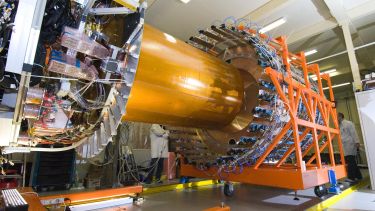SCT construction and operation
We played a major role in the construction of the Semi-Conductor Tracker (SCT) detector and continue to take leading roles in its operation and monitoring.

Our expertise:
- Construction and assembly of the SCT end-caps
- SCT Database, conditions and data acquisition development
- SCT monitoring and data quality
- Decommissioning of the Inner Detector
Background
The SCT was a major UK Atlas investment and deliverable. In Sheffield we played a major role in the construction of the Semi-Conductor Tracker (SCT) detector and we are working on its maintenance and operation, and eventually its decommissioning
We participated to the research and development of the silicon sensors since 1995 and we were active members of the sensor evaluation programme testing irradiated sensors in our clear room in Sheffield. This led to final design of the silicon wedge sensors to be used in the SCT end-cap and we carried out a full quality assurance/control in our clean room.
We built a full-scale mock up of the SCT to evaluate services layouts to aid the assembly and integration. We participated in the full Macro Assembly at Liverpool including the redesign and evaluation of new low-mass BUS tape materials.
Following the successful construction of the end-cap we led the shipping and reception testing at CERN (see Richard French in the photo). We participated to the integration with TRT, the installation of the detector and the combined testing (cosmic and test beam).
We provided rework solution for the entire SCT cooling system and carried out its installation. This was the beginning of our unique experience on cooling silicon detectors, which is now central to our ITk programme.
SCT operation
After the construction phase of the SCT we carry on the essential task of maintaining and operating the detector. This is essential to achieve the best physics from the SCT as a part of ATLAS.
Our present involvement is:
- Continuous monitoring of the SCT data is essential to ensure high quality data for physics analyses. Dawson has played a key role in the development of the SCT monitoring and data quality framework since the early days. He continues in his role as data quality expert for SCT operations, providing a significant chunk of the UK Atlas OTP effort in this area.
- Johansson is an expert in the SCT online data quality and served as SCT Run coordinator until 2015. He is based at CERN and is an expert on the SCT operation with several responsibilities from data acquisition to online reconstruction
- Several of our students are or were involved in the SCT by writing some of the monitoring software (Macdonald, Fletcher, McFayden) and running inner detector shifts
Inner detector decommissioning
The SCT had several years of successful operation and is scheduled to operate until the end of the LHC Run-3 in 2022. After that, the whole inner detector will be decommissioned and replaced by a new inner tracker (the ITk).
Richard French is the inner detector decommissioning co-coordinator, ensuring that the "old" inner detector is dismantled in a safe way, given its expected radioactive environment.
This is leading to the development of new technologies and could partly utilise robotic tools similar to those used by the nuclear industry for the decommissioning of radioactive components.
